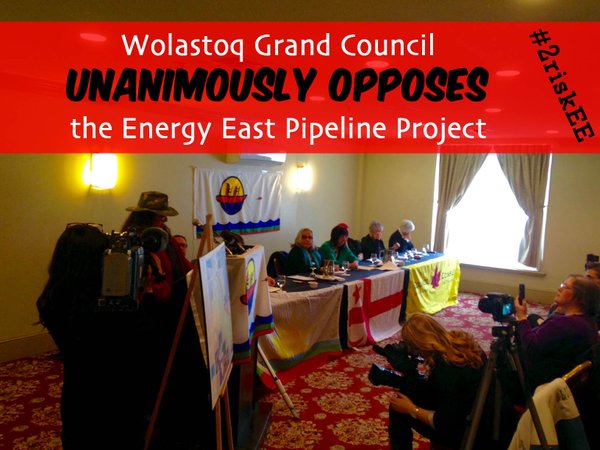Like this article? rabble is reader-supported journalism. Chip in to keep stories like these coming.
There is a growing wall of Indigenous opposition to the Energy East pipeline.
In May 2014, the Globe and Mail reported:
“Some 70 First Nations leaders met in Winnipeg recently to plan a strategy they hope will block TransCanada’s ambitious plan to ship more than 1 million barrels a day of crude from Western Canada to refiners and export terminals in the East…”
La Presse added (in French):
“The meeting brought together activists and citizens, but the presence of grand chief Derek Nepinak of the Assembly of Manitoba Chiefs [AMC] represents ‘a growing sense of unity’ among First Nations against the project, according to Clayton Thomas-Muller of the Indigenous Environmental Network.”
The Assembly of Manitoba Chiefs represents about 60 First Nations across the province.
In Jan. 2015, Treaty 3 Grand Chief Warren White stated:
“I do not want to be the grand chief who consented to a pipeline that’s going to destroy 30 per cent of the fresh water in Ontario, in Treaty 3 territory. …I came here to let everyone know what Energy East is all about… In unity in Treaty 3 we will be the ones to stop this. Our communities, our youth, our leadership are being called on by other nations. …TransCanada whatever you wanna call it, are there for the dollar signs, and nothing about the land, nothing about how we survive.”
Treaty 3 represents more than 25 Anishinaabe First Nations whose traditional territory is situated in northwestern Ontario.
In Dec. 2014, the Declaration by the Kanien’kehà:ka Kanehsatà:ke Territory stated that the Energy East pipeline “violates the land rights of the Kanehsatà:ke Mohawks and threatens the health of the environment.”
Kanesatake is located on the north shore of the Ottawa River, 53 kilometres west of Montreal. As noted on a website, “The Kanien’kehà:ka Nation, of which the Mohawks of Kanehsatà:ke are part of, have never sold nor ceded any of our lands and resources by treaty or by any forms of agreement to the Government of Canada, its provinces and municipalities.”
And now Grand Chief Ron Tremblay has stated:
“As members of the Wolastoq Grand Council we unanimously oppose the Energy East Pipeline Project in order to protect our non-ceded homeland and waterways, our traditional and cultural connection to our lands, waterways, and air. The Wolastoq Grand Council has serious concerns for the safety and protection of the animals, fish, birds, insects, plants and tree life that sustains our Wolastoq Nation.”
Clan mother Hart Perley of Tobique First Nation adds:
“The premier is adamant about bringing the toxic sludge through our homeland and we’re more adamant that it’s not going to happen. We are not allowing the pipeline to come through our homeland. It’s not going to happen.”
In New Brunswick, the Wolastoq Nation asserts Indigenous Title over the lands and waters within the entire Saint John River watershed.
The Trudeau government has pledged to fully implement the United Nations Declaration on the Rights of Indigenous Peoples. Trudeau has also personally promised to “implement all 94 recommendations from the Truth and Reconciliation Commission,” which includes “developing a national action plan, strategies, and other concrete measures to achieve the goals” of the UN declaration.
The National Observer has explained, “The UN declaration’s commitment to ‘free, prior and informed consent’ on development projects — including natural resources infrastructure — goes further than the Canadian government’s constitutional ‘duty to consult’ with Indigenous peoples.”
In accordance with the United Nations Declaration on the Rights of Indigenous Peoples’ principle of free, prior, and informed consent, the Council of Canadians respects the right of Indigenous peoples to say no to a pipeline on their territory. Council of Canadians chairperson Maude Barlow has stated, “We recognize and respect First Nations’ decisions to ban tar sands pipelines and tankers from their territories and we offer our support and solidarity.”
Like this article? rabble is reader-supported journalism. Chip in to keep stories like these coming.




